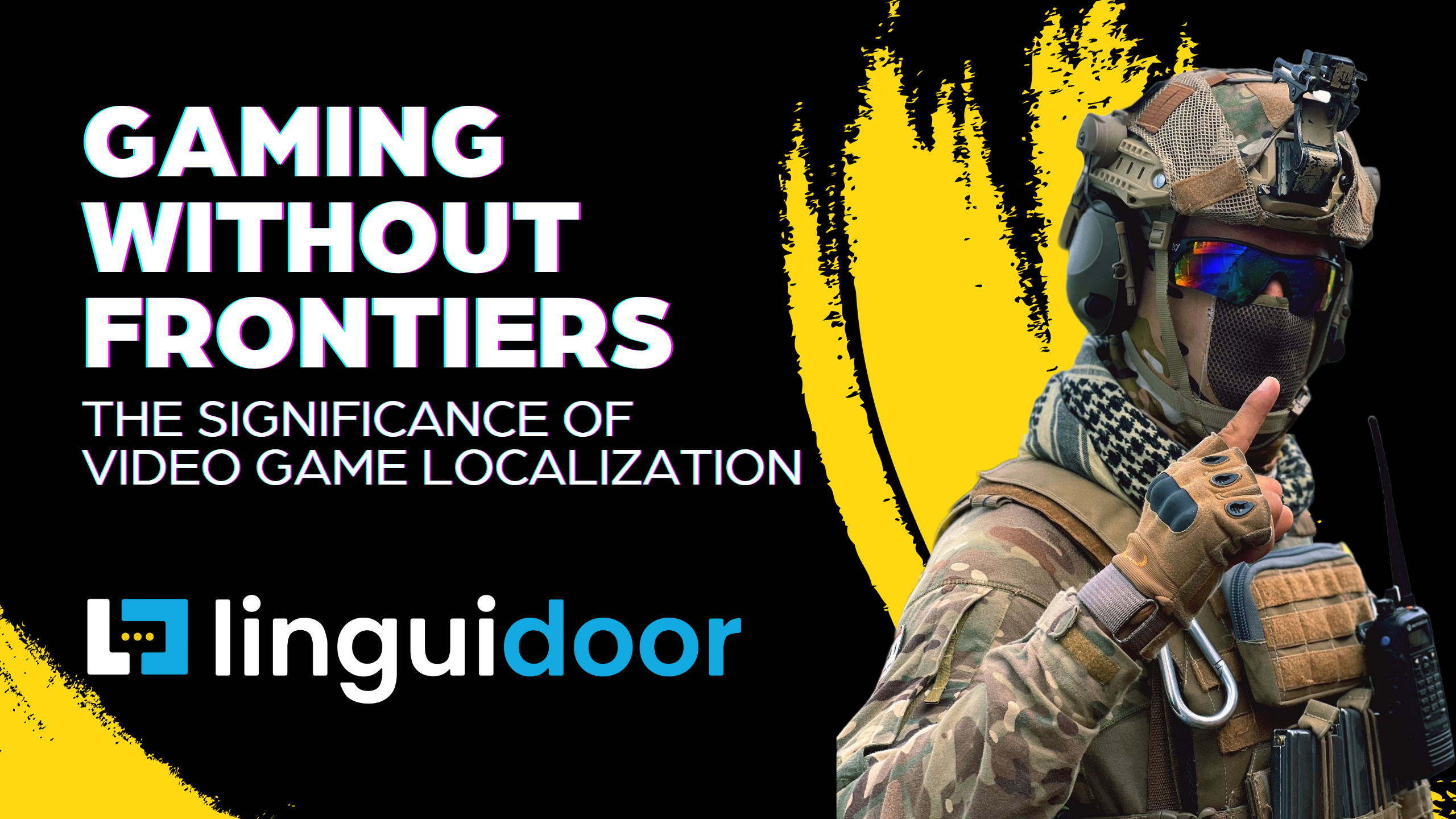Gaming Without Frontiers: The Significance of Video Game Localization

Video games have evolved into a global phenomenon, transcending cultural boundaries and languages. In this era of interconnectedness, developers are tasked with creating games that appeal to a diverse international audience. This is where the crucial process of video game localization comes into play. Video game localization is not merely about translating words; it’s about adapting games to different cultures and ensuring that players worldwide can fully immerse themselves in the gaming experience. In this blog post, we will embark on a journey through the world of video game localization, exploring success stories and unfortunate failures. We will delve into the reasons behind their outcomes to underscore the vital role of localization in the gaming industry.
Success Stories in Video Game Localization
1. “The Legend of Zelda: Breath of the Wild”
“The Legend of Zelda: Breath of the Wild” stands as a shining example of how meticulous localization can enhance a game’s global appeal. The translation team left no stone unturned, paying painstaking attention to cultural nuances, jokes, idioms, and references. By doing so, they ensured that players from various regions could connect with the game on a deeper level.
Reason for Success: The thoughtful localization allowed players to lose themselves in the breathtaking world of Hyrule, irrespective of their cultural background. It created an immersive experience that resonated globally.
2. “Final Fantasy VII”
This classic RPG achieved global acclaim, owing much of its success to impeccable localization. The translation team worked tirelessly to preserve the emotional impact of the story while adapting humor and references to suit different regions. The result was a game that was not only accessible but also enjoyable for a wide audience.
Reason for Success: The localization maintained the emotional depth and cultural relevance of the story, drawing players in and keeping them engaged throughout their journey.
3. “The Witcher 3: Wild Hunt”
CD Projekt Red’s masterpiece was a resounding success worldwide. The localization team left no stone unturned, translating the game’s extensive dialogue and text to make it feel authentic in multiple languages. They even paid close attention to regional accents and dialects, further immersing players in Geralt’s dark and complex world.
Reason for Success: Careful localization efforts ensured that players across the globe felt like they were truly living in the grim and fantastical world of The Witcher, enhancing the game’s global appeal.
4. Pokémon Series
The Pokémon franchise has consistently excelled in localization. With hundreds of creatures, numerous characters, and extensive lore, the localization team has delivered high-quality translations that resonate with players of all ages. The games’ enduring success worldwide is a testament to their exceptional video game localization efforts.
Reason for Success: Consistent, culturally sensitive localization has enabled Pokémon games to become a global phenomenon, maintaining their appeal for decades.
5. “Persona 5”
This Japanese role-playing game (JRPG) received widespread acclaim, not only for its engaging storyline but also for its impeccable localization. The Persona 5 team paid great attention to adapting cultural references, dialogue, and humor to suit an international audience. This meticulous approach contributed significantly to the game’s worldwide success.
Reason for Success: By effectively localizing the game’s intricate narrative and character interactions, Persona 5 garnered a dedicated global fanbase.

Localization Fails: Games That Fell Short
1. “Resident Evil 6”
The highly anticipated “Resident Evil 6” disappointed many fans due to its poor localization. English voice acting received criticism for its lackluster performance, leading to a disconnect between players and the game’s characters. Awkward dialogue and mistranslations hindered players’ immersion in the game.
Reason for Failure: Neglecting to invest in quality localization resulted in a subpar gaming experience, tarnishing the game’s reputation.
2. “Mighty No. 9”
Despite the hype surrounding this spiritual successor to Mega Man, it faced severe backlash upon release, partly due to its poor localization. The English voice acting and text translation were riddled with errors and lacked the charm of the original Japanese version. This negatively impacted players’ enjoyment and perception of the game.
Reason for Failure: Inadequate localization efforts led to a disheartening experience for players, ultimately affecting the game’s sales and reception.
3. “Deadly Premonition”
This cult classic game suffered from localization issues, particularly with its English voice acting. The quirky and eccentric characters lost much of their charm in translation, and the awkward script hindered players’ understanding of the game’s story and humor.
Reason for Failure: Poor localization choices diminished the appeal of the game, preventing it from gaining a wider audience.
4. “Zero Wing”
“All your base are belong to us.” This infamous line from the opening of the European release of “Zero Wing” is a prime example of a localization fail. The translation was riddled with errors, leading to unintentional humor and a lack of coherence in the storyline. This unintentional meme became iconic, but not in a way the developers had intended.
Reason for Failure: Poor localization can result in unintentional humor and detract from the game’s intended experience.
5. “Sword of Sodan”
This early ’90s action-adventure game suffered from both technical and localization issues. The English text was poorly translated, with numerous grammatical errors and confusing dialogue. Coupled with the game’s technical shortcomings, this localization disaster made “Sword of Sodan” a forgettable title.
Reason for Failure: A combination of technical problems and bad localization can sink a game’s chances of success.
The Art of Effective Video Game Localization
Effective video game localization is an art that goes beyond mere translation. It’s about capturing the essence of a game and making it resonate with players across the globe. Let’s explore what makes for a successful localization, common pitfalls to avoid, and the challenges of cultural adaptation.
What Makes for a Successful Video Game Localization?
A successful video game localization goes beyond linguistic accuracy. It involves:
Cultural Sensitivity:
Understanding cultural nuances, traditions, and beliefs to ensure the game doesn’t inadvertently offend or confuse players in different regions.
Adaptation of Humor and References:
Tailoring humor and pop culture references to make them relevant and amusing to the target audience.
Preservation of Narrative and Emotional Impact:
Ensuring that the story’s emotional depth is maintained in the target language, allowing players to connect with the characters and plot.
Common Pitfalls to Avoid
Literal Translation:
Direct translations can often result in awkward phrasing or loss of meaning. It’s essential to adapt the text to fit the context and culture.
Ignoring Regional Differences:
Different regions have different preferences and sensitivities. Ignoring these can lead to misunderstandings or even backlash.
Inconsistent Terminology:
Failing to establish consistent terminology for in-game elements can confuse players.
The Cultural Adaptation Challenge
Adapting a game to different cultures can be a daunting task. It involves more than just language; it requires a deep understanding of the target audience. Developers must research cultural norms, values, and taboos to ensure a smooth gaming experience.

Beyond Language: Localization in Game Design
Localization doesn’t stop at words; it extends to the very core of a game’s design. Here’s how it impacts various aspects of game development.
Cultural Sensitivity in Character Design
Character design plays a crucial role in a game’s appeal. Developers must ensure that characters’ appearances, behaviors, and backgrounds align with the cultural norms and preferences of the target audience.
Localization Impact on Gameplay Mechanics
Gameplay mechanics can also be influenced by localization. Certain puzzles, challenges, or mechanics may need adjustment to suit different regions. For example, a puzzle relying on knowledge of a specific culture’s history may need modification for international audiences.
Adapting Puzzles and Challenges
Puzzles and challenges should be culturally neutral and accessible to all players. Developers must strike a balance between providing a meaningful challenge and ensuring that the solutions aren’t overly tied to a specific culture’s knowledge.
The Economic Impact of Video Game Localization
While localization is an investment, it can lead to substantial returns. Here’s a closer look at its economic impact in the gaming industry.
Localization Costs and ROI
Quality localization can be expensive, involving translation, voice acting, and testing. However, the return on investment can be significant when a game successfully taps into new markets.
Localization as an Investment
Localization shouldn’t be viewed as an expense but as an investment in a game’s long-term success. By making games accessible to a broader audience, developers open up new revenue streams.
Expanding Market Reach through Video Game Localization
The global gaming market is vast and diverse. Localization enables developers to tap into markets that would otherwise be out of reach due to language and cultural barriers.

The Evolving Landscape of Video Game Localization
The world of video game localization is constantly evolving. Let’s explore some of the trends shaping its future.
Trends in Video Game Localization
Simultaneous Release:
With the growth of online distribution platforms, simultaneous worldwide releases are becoming more common, reducing the risk of spoilers and piracy.
Cultural Consultation:
Developers are increasingly seeking input from cultural consultants to ensure authenticity and sensitivity in their games.
Voice Acting Quality:
High-quality voice acting is now expected in many games, requiring careful casting and direction in multiple languages.
The Future of AI-Driven Localization
Artificial intelligence and machine learning are being used to streamline the localization process. These technologies can assist in translating and adapting games faster and more accurately.
Challenges in Multilingual and Multicultural Games
Games with complex narratives and vast worlds face challenges in providing consistent quality across all languages and cultures. Maintaining the same level of detail and immersion can be a daunting task.
The power of video game localization cannot be overstated
Effective video game localization allows players worldwide to enjoy and connect with a game’s story, characters, and world. Success stories like “The Legend of Zelda: Breath of the Wild” and “Final Fantasy VII” demonstrate the positive impact of quality localization, while the failures of “Resident Evil 6” and “Mighty No. 9” underscore the consequences of neglecting this critical process.
As the gaming industry continues to expand and globalize, localization will play an increasingly vital role. Developers must recognize that meticulous attention to detail in localization can be the difference between a global hit and a missed opportunity.
Ready to take your video game to the global stage?
Trust Linguidoor, the industry leader in video game localization. Our team of expert linguists and cultural consultants will ensure that your game is not just translated, but culturally adapted to resonate with players worldwide. Don’t leave the success of your game to chance—partner with Linguidoor for flawless localization that unlocks new markets and captivates gamers everywhere. Contact us today and let’s embark on a journey to make your game a global sensation!

Made up your mind yet?
Empower your globalization goals today!




